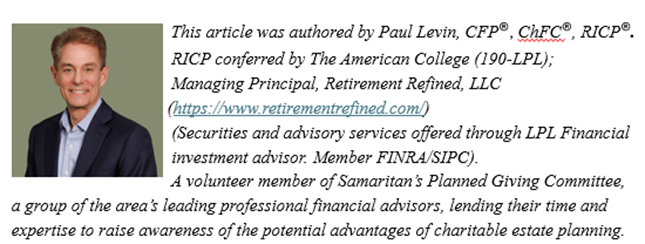Framing the Issue
By Paul Levin, CFP®, ChFC®, RICP®, Managing Principal of Retirement Refines, LLC; and a member of Samaritan’s Planned Giving Committee, a group of the region’s leading financial advisors, volunteering their time and expertise to raise awareness of the impact and advantages of charitable tax and estate planning.
Life is good!

Your kids are out of college, and you are now empty nesters. Your career is mature; your finances are in good order and life is going well. You and your spouse are free to take time off work for travel and enjoy the fruits of your labor. Hey, you deserve it. You raised good children, have been a good son/daughter and lived your life responsibly. You’re thinking, perhaps, we can really retire, maybe even earlier than anticipated. Wonderful!
The Phone Rings
It’s your mom, your dad is in the hospital. Emergency surgery. ICU. Please get here as soon as possible.
Your heart stops, your mind is racing. Can you simply drive over now? What about that critically important work presentation later today? After work, you are to meet a contractor at your home to fix your leaking roof as your wife is away on business.
As you drive over, your mind continues to race. He’s going to be ok! He is my rock. Oh my, this cannot be happening now. You call to inform your sister. She also drops her workday to head to the hospital.
What if Dad is not ok? What happens next? I’m sure mom and dad know exactly what to do. Hmmm?
Your life may have changed—instantly.
This story is not unique. In fact, it defines the reality of many adults in their 40s, 50s, and 60s who are now part of what is called the sandwich generation, those who are simultaneously supporting aging parents and adult children, often while managing their own careers and financial futures.
As longevity increases and healthcare costs rise, many are caught unprepared—emotionally, financially, and logistically. This white paper addresses those challenges, highlights the hidden risks, and outlines critical steps you can take now to protect yourself and your loved ones.
The challenges someone faces when placed in this position can be overwhelming, energy draining, impacting your overall attitude.
__________________________________________________________________
It’s Time, what is next?

You recognize its time; your family member now requires assistance with daily living, meaning they cannot take l00% care of themselves. They may have a physical impediment making getting out of bed, moving around the home and meal preparation difficult. Perhaps mom or dad has a memory issue, often forgetting to take her medication. This list of possibilities is significant.
Can your loved one be cared for in the comfort of their home? At what cost? How will the care be paid? Do they have long term care insurance? If not, or an inadequate amount, which savings/investment account do you withdraw funds? What are the income tax implications? Are you the Power of Attorney with the necessary authority?
In many situations, we prefer to be cared for in the comfort of our own home. This can be expensive when needing custodial and/or nursing care several days per week. As one’s care needs increase, the ability to remain in the desired surroundings is challenged.
Beyond being cared for at home, care may be administered in an assisted living facility or nursing home. Continuing Care Communities continue to remain appealing to many. These communities enable you to enter as a 100% self-sufficient adult, however, have various levels of care access as needed in the future.
Assisted Living Facilities, Nursing Homes and Continuing Care Communities have significant variations, cost structures and obligations. The complexities and ramifications must be clearly understood.
____________________________________________________
Understanding Realities
The Emotional Toll
Juggling the care of aging parents while maintaining relationships, raising children, and managing a career can lead to burnout, resentment, and guilt. These emotional strains often go unspoken but are deeply felt. Even with love and good intentions, many feel they are never doing enough—for anyone.
The Time Crunch
Caregiving can become a full-time job. Doctor appointments, meal prep, daily check-ins, and emergencies all add up. Vacation days are spent caregiving; marriages can experience stress and finding time for a round of golf may become challenging.
Financial Strain
Costs of care—whether home-based, assisted living, or nursing facilities—can be staggering. Many families are unprepared for long-term care expenses, especially if insurance is limited or nonexistent. Some adult children even leave their jobs or reduce hours, jeopardizing their own retirement security.
Watching your parents’ assets dwindle due to the excessive cost of care is frustrating. You may be witnessing your future inheritance shrink. Many adult children will struggle with trying to care for their parents themselves, attempting to salvage their inheritance. Most likely, a potential financial inheritance is not worth the emotional and physical stress.
Healthcare System Frustration
This one is a doozy! Navigating Medicare, specialists, insurance claims, and long-term care options often feels like a part-time job with no manual. Persistence is required—but even persistence does not guarantee clarity.
Attempting to schedule doctor appointments, dealing with voicemails & bots; not a preferred way to spend one’s time!
Workplace Inflexibility
While some employers offer caregiving leave or hybrid schedules, many do not. Self-employed individuals face declining productivity and lost income during caregiving years.
Lack of Planning
This is the most critical issue. Families often wait until a crisis to start planning. Without advanced directives, powers of attorney, and coordinated financial strategies, even the most devoted child may find themselves powerless during an emergency.
__________________________________________________________
Steps to Prepare:
 1. Start With Your Own Financial Plan
1. Start With Your Own Financial Plan
- Do you have a comprehensive financial plan?
- Are your estate documents—will, power of attorney, healthcare directive—up to date?
- If not, work with an experienced financial advisor and an estate planning attorney to get your own house in order first. This will provide clarity and confidence when assisting your parents. It will also heighten your understanding when dealing with your parents.
2. Initiate The Family Conversation
Yes, it may feel awkward—but it is necessary. Consider this script:
“Mom, Dad, I love you. I’ve been learning about the challenges families face when a loved one can no longer care for themselves, even in a limited fashion. I want to be sure I know your wishes and that you are taken care of in a way that reflects your desires, values, and dignity.”
Other Considerations:
- You or your parents may have experienced a friend or relative needing care, which may assist the discussion.
- Understanding your parents’ desires and preferences is an important first step prior to discussing their financial situation.
- Resistance is normal. Pride and privacy run deep, however persistence, framed in love, pays off.
3. Review Their Legal and Financial Documents
Make sure they have:
- A durable power of attorney for finances
- A healthcare directive/living will
- An up-to-date will or trust
If you are listed as a personal representative, agent, or trustee, make sure you understand the responsibilities.
Having these documents reviewed by an estate attorney is a necessary step. Making certain mom/dad’s desires are reflected must be a priority.
4. Model the Financial Impact
Having a meeting with mom/dad, their financial advisor and you, will assist your understanding.
A financial advisor can project the financial ramifications of a long-term care need:
- Which savings/investment accounts should be utilized?
- Will their assets last?
- How will taxes impact withdrawals from retirement accounts?
- Can their portfolio be repositioned to better support income and liquidity?
- Will Medicaid or Medicaid planning be necessary?
__________________________________________________________________
Real Experience, Real Lessons
My personal experience: first was part-time for my father who had a stroke, then
full-time for my mother battling cancer. The routine was exhausting, the emotions deep, the financial strain significant. And yet, the ability to show up daily was a gift.
Everything else in life became second in line. My business and my morning workouts were my anchors. But without planning and family support, I would have drowned.
__________________________________________________________________
Final Thoughts: You’ll Never Regret Being Prepared
No one wants to pry. No one wants to think about their parents becoming ill or dependent. But the pain of not knowing what they want—what they’ve planned,
or have not—can make an already difficult situation worse.
You will not regret preparing, asking questions, or being the “pushy” child today.
You will regret the chaos, guilt, and confusion that come with silence and delay.
__________________________________________________________________
Call to Action
If you are in the sandwich generation—or expect to be—do not wait for a crisis. Take action today:
- Schedule a financial planning meeting to create or update your plan.
- Facilitate a family meeting to understand your parents’ wishes and legal readiness.
- Partner with professionals who can guide you through these emotionally and financially complex decisions.
When the phone rings—because someday it will—you will be ready to support your loved ones with grace, clarity, and confidence.
As always, we recommend the counsel of your trusted professional financial advisor. To learn more about the potential advantages of charitable tax and estate planning, and special donor recognition accorded through eternal membership in The Legacy Society, please contact Chris Rollins, Samaritan’s Chief Development Officer, at (856) 552-3287 or [email protected].


The information on this page is provided for educational purposes only and is not intended as legal, tax, or financial advice. We encourage you to consult with your attorney, accountant, or financial advisor to determine how any planned giving strategy may affect your individual circumstances. Samaritan does not provide legal or tax services. Any references to estate planning tools, financial strategies, or third-party resources – including FreeWill – are offered as general guidance, and for your convenience. Use of these tools or services does not constitute a professional relationship with Samaritan, nor does Samaritan receive compensation for your use of them. Your personal advisors are best equipped to help you make decisions that serve your interests, your loved ones, and your legacy intentions.
